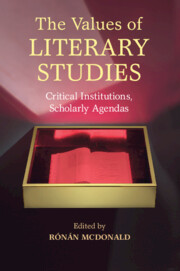Book contents
- Frontmatter
- Contents
- Notes on Contributors
- Acknowledgments
- Introduction
- 1 The Value of Criticism and the Project of Modernism
- 2 Caprice: Individual Subjectivity in Literary Criticism
- 3 The Phenomenology of Literary Valuation
- 4 Literature Is History: Aesthetic Time and the Ethics of Literary Will
- 5 Dead on Arrival: Time and the Value of Old Books
- 6 The Price of Value
- 7 To Shelter the Nothing That Happens
- 8 When Literary Criticism Mattered
- 9 Literature among the Objects of Modernist Criticism: Value, Medium, Genre
- 10 “Vale!” : Psychoanalysis, Value, and Literature
- 11 Afterlives of Comparison: Literature, Equivalence, Value
- 12 Feminism, Gender, and the Literary Commons
- 13 The Value of World Making in Global Literary Studies
- 14 Multiple Versions and Fictional Minds: Manuscript Research, Digital Editing, and Enactive Cognition in Literary Studies
- 15 After Suspicion: Surface, Method, Value
- 16 Literary Experience and the Value of Criticism
- Index
4 - Literature Is History: Aesthetic Time and the Ethics of Literary Will
Published online by Cambridge University Press: 05 November 2015
- Frontmatter
- Contents
- Notes on Contributors
- Acknowledgments
- Introduction
- 1 The Value of Criticism and the Project of Modernism
- 2 Caprice: Individual Subjectivity in Literary Criticism
- 3 The Phenomenology of Literary Valuation
- 4 Literature Is History: Aesthetic Time and the Ethics of Literary Will
- 5 Dead on Arrival: Time and the Value of Old Books
- 6 The Price of Value
- 7 To Shelter the Nothing That Happens
- 8 When Literary Criticism Mattered
- 9 Literature among the Objects of Modernist Criticism: Value, Medium, Genre
- 10 “Vale!” : Psychoanalysis, Value, and Literature
- 11 Afterlives of Comparison: Literature, Equivalence, Value
- 12 Feminism, Gender, and the Literary Commons
- 13 The Value of World Making in Global Literary Studies
- 14 Multiple Versions and Fictional Minds: Manuscript Research, Digital Editing, and Enactive Cognition in Literary Studies
- 15 After Suspicion: Surface, Method, Value
- 16 Literary Experience and the Value of Criticism
- Index
Summary
I
Literature is fundamentally a mode of experimentation with the possibilities and capacities of human agency. What we value on this account is the prospect for the production of value. I propose that, within the bounds of literary tradition, the primacy of human action is a precondition of being in the world, rather than the world simply giving place to human agency. An often underappreciated presupposition of the former stance is that our agency is anchored in perception: attentiveness to the forms of worldly experience. This anchorage secures our faith in literary form as something other than mere historical objecthood. More importantly it occasions the thought that the historical experience we so often take to be allegorized in literary form may be inextricable from readerly action: an action concordant with the perceptual vivacity that commands human attentiveness. Such an assertion, of course, will require a persuasive account of how reading is a mode of action, hence a type of historical production. It furthermore will entail stipulating what possibilities of human self-understanding – that is to say, prospects for agency – our countenancing the act of reading as a mode of historical production allows. We may then think more resourcefully about what it means to read ourselves into history without sacrificing the futurity that human agency otherwise beneficently portends. My purpose is to demonstrate how tracking the conditions of intelligibility in a literary work of art constitutes a historical enterprise of sorts: one that does not mitigate historical fact but persuades us of its inextricability from aesthetic articulateness.
I must acknowledge that I am going against the grain of contemporary discussions of the relation of history to literature. Since the advent of New Historicism in literary studies, we have been admonished, with almost revolutionary fervor, that every expressive act is implicated in a network of material historical practices. These practices mask potentially tyrannical powers. The assumption is that the literary critic is obliged to perform a thick accounting of the historical density of the world in which the literary text arises. Only then can its internal contradictions, occasioned by power relations, be exposed to critical scrutiny. It is hard not to sympathize with the emancipatory sentiments touted by this methodology. It is just as hard to imagine how such sympathies might have the political consequence that they advertise.
- Type
- Chapter
- Information
- The Values of Literary StudiesCritical Institutions, Scholarly Agendas, pp. 59 - 74Publisher: Cambridge University PressPrint publication year: 2015

